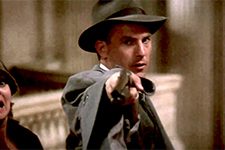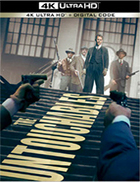The Untouchables (4K UHD)
|  So there Brian De Palma was. At the end of filming The Untouchables, his big-budget, highly stylized, Prohibition-era crime saga about the (highly fictionalized) exploits of federal agent Eliot Ness and his attempts to bring down Chicago crime king Al Capone, he was already some $8 million over his initial $16 million budget, and the film’s climax, an elaborate action sequence taking place at the Union Station in Chicago, had yet to be filmed. According to producer Art Linson, as told in Laurent Bouzereau’s book The De Palma Cut, the sequence as written was to involve a great deal of costly, elaborate effects that the production simply could not pay for. He told De Palma, “Brian, we’re out of money. Sorry, the moving trains, the helicopter shots, we can’t do it. You have the stairs, some extras, and some guns—make it exciting, give us something we haven't seen before...” Which is, of course, exactly what De Palma delivered. Well, to backtrack a bit, it wasn’t exactly something that had never been seen before. As a director who is both wildly inventive and perpetually adept at utilizing stylistic devices pioneered by the great masters of cinema (Alfred Hitchcock being his primary inspiration), De Palma seized the opportunity to borrow the visual structure from the infamous Odessa Steps sequence in Sergei Eisenstein’s Battleship Potemkin (1925) to create a 15-minute action sequence that is among the most invigorating ever committed to celluloid. Devised on set with minimal props, De Palma choreographed a complex shoot-out that first employs real-time editing and an insistent emphasis on a large clock to build the tension to the point of being unbearable and then uses slow motion and creative camera placement in the violent release. As anyone who has seen it knows, the sequence involves a gun battle between Eliot Ness (Kevin Costner) and a half-dozen of Capone’s men on the enormous steps of the Chicago train station. The sequence is intensified all the more because a baby carriage carrying an infant is rolling down the steps during the gunfight, and Ness must both return fire and attempt to save the child. It is a masterpiece of violent action crafted out of camera movement, editing, and minimalist sound design. The film surrounding it on either side has its flaws, but is overall an exciting piece of pulp action that plays fast and loose with the historical facts (to quote The Man Who Shot Liberty Valance, “when the legend becomes fact, print the legend”). Unusually melodramatic and emotional for De Palma, whose films are typically more chilling and calculated, The Untouchables is like a great crime comic book come to life. Extraordinarily stylized, from the sleek ’30s-era suits by noted fashion designer Giorgio Armani, to the Oscar-winning art-deco set design by Hal Gausman, The Untouchables is nothing if not visually exhilarating. De Palma pushes every scene to its very limit, whether that be the deliriously contrived final courtroom sequence or the death of a major character drawn out in sputtering, movie-style death thralls to the sound of Pagliacci. Kevin Costner, at the beginning of his sharp rise to stardom at the end of the 1980s, is excellent at portraying both the innocent idealism of Ness at the beginning of the film and the hardened man who emerges victorious at the end. Costner manages to embody Ness’s nearly superheroic qualities and his dogged humanity without making the two seem unresolvable. When a Canadian police officer expresses outrage at the methods employed by Ness and his men to extract a confession from one of Capone’s cronies, Ness’s simple reply is, “Yeah? Well, you’re not from Chicago.” In other words, Ness has to become as much a part of the sordid world of Chicago as Capone in order to save it. A large part of Ness’s education in the ways of dealing with organized bootlegging Chicago-style comes from James Malone (Sean Connery in an Oscar-winning role), an aging, Irish beat cop who agrees to become Ness’s mentor and partner. Malone has been in Chicago all his life, and he knows the in’s and out’s of corruption and crime and how deeply they have infiltrated the police department (he, of course, has not sunk to the level of corruption, which explains why he is still walking the beat at his age). His teachings tend to come in short, pithy statements that are like tough-guy variations of philosophical proverbs (“The first rule of police work: Make sure when your shift is over you go home alive”). Every bit that Ness is naïve, Malone is wise, and part of his role is goading Ness into taking the next step he might otherwise not have taken (Malone’s recurring line is, “What are you prepared to do?”). Teaming up with a sharp-shooting Italian recruit from the police academy, George Stone (Andy Garcia), and an accountant from the Treasury Department (Charles Martin Smith), Ness and Malone form “The Untouchables,” a select group within the Chicago police department dedicated to bringing down Al Capone and avoiding the corruption that has crippled the rest of law enforcement. The film’s title and general thrust are derived from the 1959–63 television series that also showcased the exploits of Ness (then played by Robert Stack), a real-life federal agent who was largely responsible for Capone’s eventual prosecution on income tax evasion. The script by playwright and filmmaker David Mamet is one of the film’s weak points, as it is surprisingly sloppy at times. The plotting is filled with holes (the action sequence on the Canadian border seems not only improbable, but also wildly out of place visually), and the dramatic scenes between Ness and his wife, Catherine (Patricia Clarkson), border on the insufferable in their drive to humanize Ness the superhero. The dialogue continually emphasizes the domestic joys of marriage and fatherhood, and because scenes of this nature are in relatively short supply, De Palma works overtime to make them matter. He works a little too hard, although you might suspect that he is also playing them as satire of cliché American hearth-and-home sentiments. But, of course, this is not where the film's heart is. Rather, it is in the action and in the physical banter between cops and criminals. Make no mistake, The Untouchables is a supremely violent movie. De Palma lavishes camera attention on slow-motion blood squibs and large pools of red; he seems particularly enthralled with head trauma, and he makes sure that whenever a character is shot in the head (which is at least half a dozen times), we are sure to notice the brain fragments generously splattered on the wall. In one shocking sequence, Capone uses a baseball bat to bash in the head of one of his associates at an elegant dinner party, and De Palma lingers on the victim’s gushing skull in a long, slow upward tracking shot. Of course, the violence in The Untouchables serves the same point as the violence in The Godfather (1972): It makes clear that, no matter how exciting organized crime is as a subject for pulp fiction, the reality of its bloodshed is unmistakable and should not be forgotten. The Untouchables is hardly meant to be taken seriously as a drama about the criminal element; it is far too outlandish to be believed. Yet, like all great action films, there is still an element of truth to it all, most notably in the characters. For as much as they become superhero vigilantes, Eliot Ness and the other members of the Untouchables remain fully human throughout.
Copyright © 2022 James Kendrick Thoughts? E-mail James Kendrick All images copyright © Paramount Home Entertainment | |||||||||||||||||||||||||||||
Overall Rating: 


 (3.5)
(3.5)


